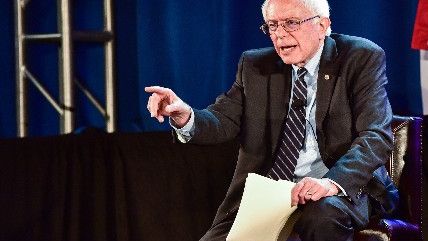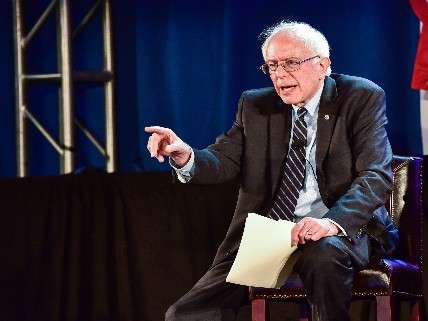Bernie Sanders Skipped AIPAC, But Gave a Middle East Policy Speech Anyway
Unlike Hillary Clinton and the Republicans at the pro-Israel lobby conference, Sanders acknowledged there are two sides to peace negotiations.

Much has been made about Sen. Bernie

Sanders (I-Vt.) being the only candidate from the two major political parties to skip this year's American-Israel Public Affairs Committee (AIPAC) policy conference. To some, he's a self-hating Jew, to others, his absence is a form of quiet protest that positions him as the conscience of progressivism.
The democratic socialist senator had been strongly urged by prominent leftist pro-Palestinian activists (including anti-Zionist writer Max Blumenthal and former Pink Floyd bassist Roger Waters, who has endorsed Sanders) to skip the event that they claim promoted "the racist, militaristic, and anti-democratic policies of the most right-wing government in Israel's history." Sanders' campaign made no reference to those calls, instead blaming his absence on a busy campaign schedule that had him traveling in Utah yesterday.
Sanders had offered to speak via video to the conference, but was refused by the event's organizers. However, in 2012, AIPAC made exceptions for two candidates who were too busy campaigning for president to make it to the hugely influential lobby group's annual meeting, Mitt Romney and Newt Gingrich.
The latter's disengaged performance via video screen (he literally fell asleep while waiting to speak and addressed a panel that was not there) might have had something to do with AIPAC's insistence this year that all the presidential hopefuls wishing to speak be physically present.
In her remarks to AIPAC, Hillary Clinton subtly jabbed at Donald Trump, who had previously promised to be "neutral" in any negotiations between Israel and the Palestinians when she said, "We need steady hands, not a president who says he's neutral on Monday, pro-Israel on Tuesday, and who knows what on Wednesday, because everything is negotiable."
For his part, Trump's speech to AIPAC made no mention of neutrality, saying "The Palestinians must come to the table knowing that the bond between the United States and Israel is unbreakable."
Three of the four presidential candidates in attendance took shots at what Clinton blasted as the "alarming" Boycott Divest Sanction (BDS) movement, saying "Particularly at a time when anti-Semitism is on the rise across the world, especially in Europe, we must repudiate all efforts to malign, isolate and undermine Israel and the Jewish people."
In statements fraught with chilling ramifications for freedom of speech and protest, Gov. John Kasich (R-Ohio) promised to "use the full force of the White House to fight this scourge" of BDS, while Sen. Ted Cruz (R-Texas) went so far as to say that any college that participates in BDS will lose federal funding and, if in legal violation, "will be prosecuted to the fullest extent of the law."
At a rally in Salt Lake City, Sanders gave a speech he almost certainly would not have delivered to AIPAC, but which addressed his Middle East policy in depth.
Leading off by mentioning the indisputable fact that he is the only major presidential candidate to have ever spent time living on an Israeli kibbutz, then extolling the historical and cultural ties between the US and Israel, Sanders said Israel requires "the unconditional recognition" of its right to exist from "the entire world" and that Hamas and Hezbollah must "renounce their efforts to undermine the security of Israel."
Next, Sanders pivoted into a bit of pragmatic realism that would have been a non-starter at AIPAC:
But peace also means security for every Palestinian. It means achieving self-determination, civil rights, and economic well-being for the Palestinian people.
Peace will mean ending what amounts to the occupation of Palestinian territory, establishing mutually agreed upon borders,and pulling back settlements in the West Bank, just as Israel did in Gaza – once considered an unthinkable move on Israel's part.
Sanders can hardly be described as a harsh critic of Israel and has even engaged in some heated debates on the subject with his own constituents, but his acknowledgment that both sides of conflict have committed terrible acts of violence against civilians provided a nuance to the conversation that was lacking at AIPAC yesterday:
Of course, I strongly object to Hamas' long held position that Israel does not have the right to exist. Of course, I strongly condemned indiscriminate rocket fire by Hamas into Israeli territory, and Hamas' use of civilian neighborhoods to launch those attacks. I condemn the fact that Hamas diverted funds and materials for much-needed construction projects designed to improve the quality of life of the Palestinian people, and instead used those funds to construct a network of tunnels for military purposes.
However, let me be very clear: I – along with many supporters of Israel – spoke out strongly against the Israeli counter attacks that killed nearly 1,500 civilians, and wounded far more. I condemned the bombing of hospitals, schools and refugee camps.
Sanders also addressed what he described as an imperfect Iranian nuclear deal:
I do not accept the idea that the "pro-Israel" position was to oppose the deal. Preventing Iran from getting a nuclear weapon will strengthen not only America's security, but Israel's security as well. And I am not alone in that idea. While Prime Minister Netanyahu is vocally opposed to the accord, his is hardly a consensus opinion in Israel. Dozens of former security officials, including retired Army generals and chiefs of the Shin Bet and Mossad intelligence agencies support the agreement.
But let me be clear: if Iran does not live up to the agreement, we should re-impose sanctions and all options are back on the table.
There really was nothing radical or overtly dovish about anything Sanders had to say. One could even argue that his Middle East policy speech was a pretty bland embrace of the status quo, with nudges toward peace and a willingness to negotiate with hostile actors.
That said, it's hard to imagine even someone like the first Jewish-American candidate to ever win presidential delegates giving a speech like this before AIPAC, especially on a day when his Democratic rival was trying to position herself as a more intransigent supporter of Israel than any of the Republicans in attendance.


Show Comments (36)